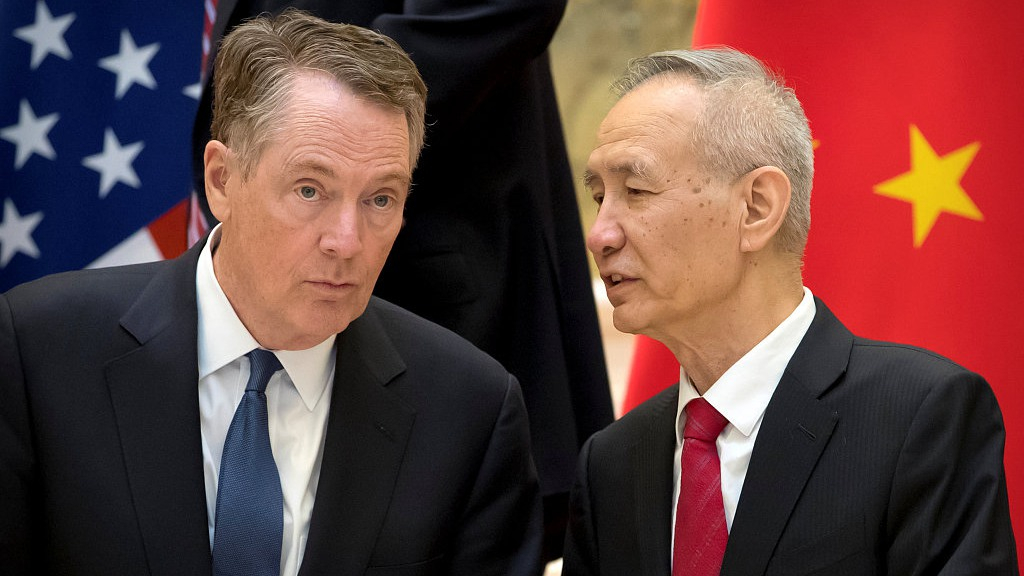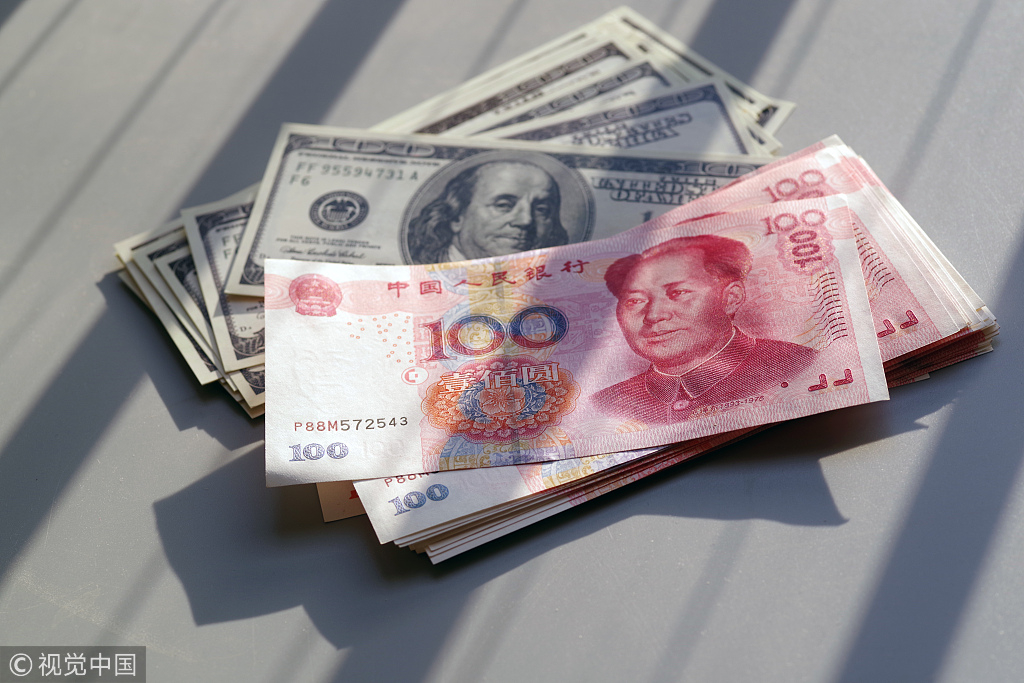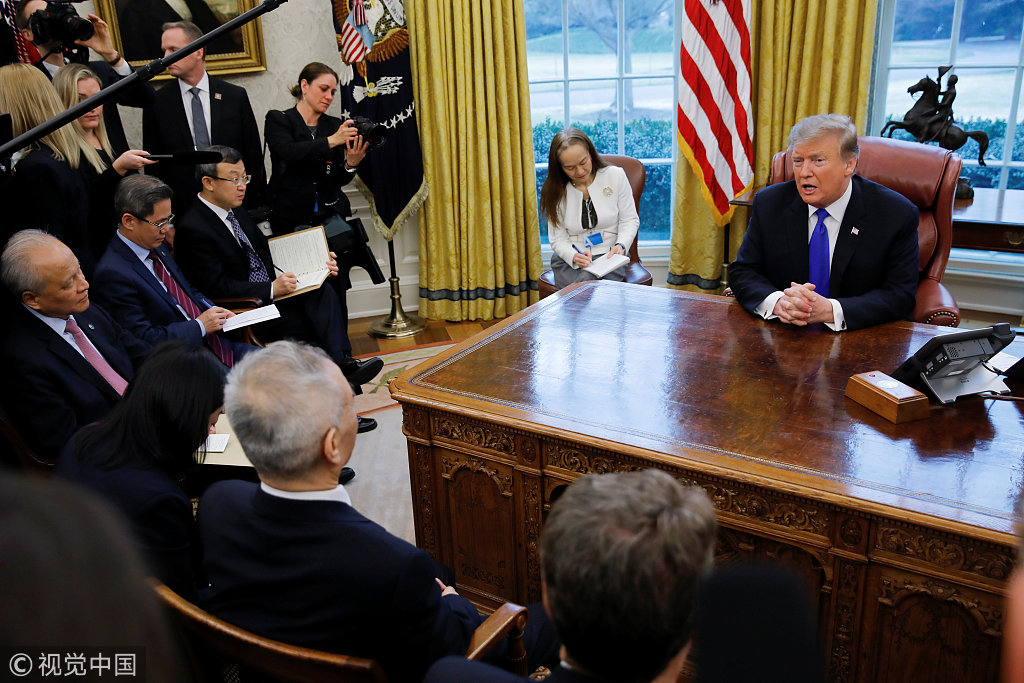
Analysis
08:52, 28-Mar-2019
High-aimed trade negotiations should not be influenced by trifles
Updated
11:11, 29-Mar-2019
Yang Chuchu

"Cooperation is the only right choice for Sino-U.S. relationship. Harmony between the two will propel global prosperity while struggle will lead to global chaos, and breach to decline," said Chen Wenling, chief economist at the China Center for International Economic Exchanges, while sharing her views on the ongoing trade negotiations.
According to a research by Jerome A. Chazen Institute for Global Business, China-U.S. trade frictions cost the U.S. around 7.8 billion U.S. dollars in 2018, with both imports and exports down 31.5 percent and 11 percent respectively.
Never, since WWII, has the world cast so much attention on China-U.S. trade frictions.
Trade negotiations between the two countries, since December 2018, have been raising deep concerns about the influence of its results on globalization and global economy.
In October last year, the International Monetary Fund (IMF) lowered its 2019 global growth forecast to 3.7 percent, partly due to China-U.S. trade frictions.
"The trade frictions launched by the U.S. have gone against the objective law of economic growth, the trend in global development, and the demands in global governance," Chen said.

VCG Photo
VCG Photo
Now, the two countries will have the latest round of negotiations starting March 28, with two sides showing more determination to reach a deal to end the long-standing and exhausting standoff. However, talks about some of the hurdles between the two are still widespread.
Among others, the U.S. criticism of China on intellectual property (IP) and foreign investment conditions is a hot topic. In fact, according to the World Intellectual Property Organization, 2017 witnessed a new record of global demand for IP tools, with China in the leading position of registering growth. Besides, during the Two Sessions in March, China passed a new foreign investment law, aiming at further opening China's market and providing more favorable environment for foreign enterprises.
While there are tricky issues for China and the U.S., it should also be noted that solving them should comply with the whole picture of economic and trade consultations and, moreover, China's development path.
Just as Beijing has repeatedly emphasized, for gaining a deal, any enforcement mechanism must be "two-way, fair and equal." It means that reaching a deal should not come with one-sided benefits and development.

U.S. President Donald Trump meets with Chinese Vice Premier Liu He and members of the Chinese delegation in the Oval Office at the White House in Washington, DC, U.S., February 22, 2019. /VCG Photo
U.S. President Donald Trump meets with Chinese Vice Premier Liu He and members of the Chinese delegation in the Oval Office at the White House in Washington, DC, U.S., February 22, 2019. /VCG Photo
According to Chen, the U.S. has been increasingly agitated by China's growing influence in the world and its confidence. Based on the Thucydides's trap, a dangerous dynamic appears when an established power feels threatened from a rising power, such as the Cold War between the U.S. and the Soviet Union. And with China-U.S. trade frictions, Western media have repeatedly talked about the possibility of a second Cold War.
The economic ties between Beijing and Washington have never before been as tight as they are today, China-U.S. bilateral trade volume reached 633.5 billion U.S. dollars in 2018, with two-way investment adding up to 240 billion U.S. dollars, said Chen, emphasizing that China and the U.S. are each other's largest trading partners.
The deeply-interlinked American and Chinese economies signify the interdependence between the two countries, which means there's little possibility of a second Cold War.
And for building more trust, Beijing and Washington can build monitoring mechanisms and a protocol for regular dialogue, just like the annual U.S.-China Comprehensive Economic Dialogue, for the two sides to better understand each other's thoughts and aims.
The Sino-U.S. relationship is also of high significance to the international community, with many second-and-third-order influences, and it is high time for them to prioritize their high aims instead of trifles.
(Cover photo: U.S. Trade Representative Robert Lighthizer, left, listens as Chinese Vice Premier Liu He talks while they line up for a group photo at the Diaoyutai State Guesthouse in Beijing, China, February 15, 2019. /VCG Photo)
(If you want to contribute and have specific expertise, please contact us at opinions@cgtn.com.)

SITEMAP
Copyright © 2018 CGTN. Beijing ICP prepared NO.16065310-3
Copyright © 2018 CGTN. Beijing ICP prepared NO.16065310-3